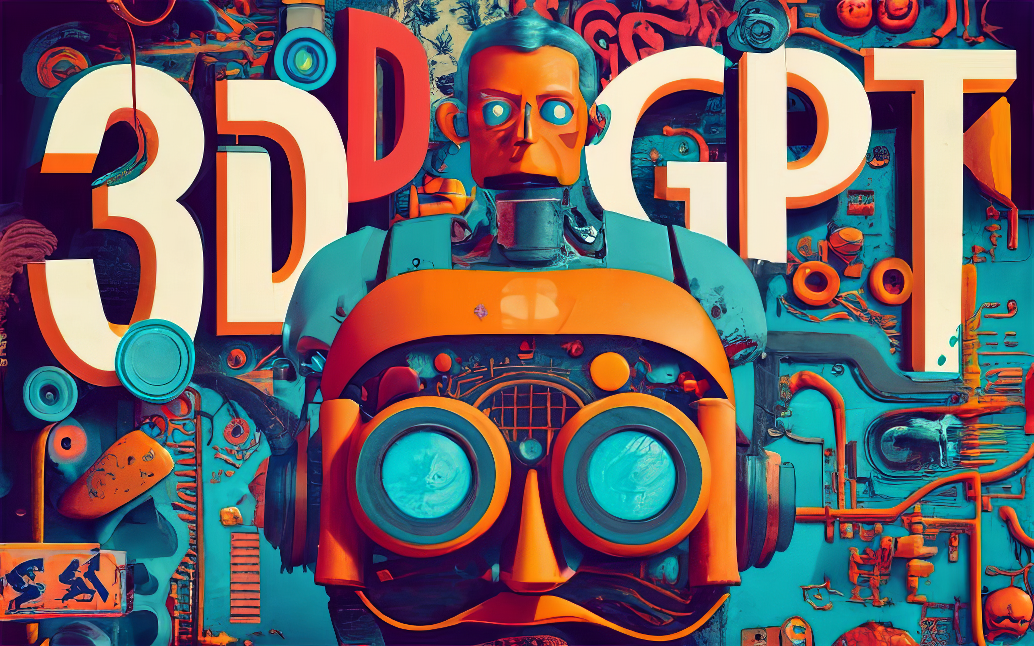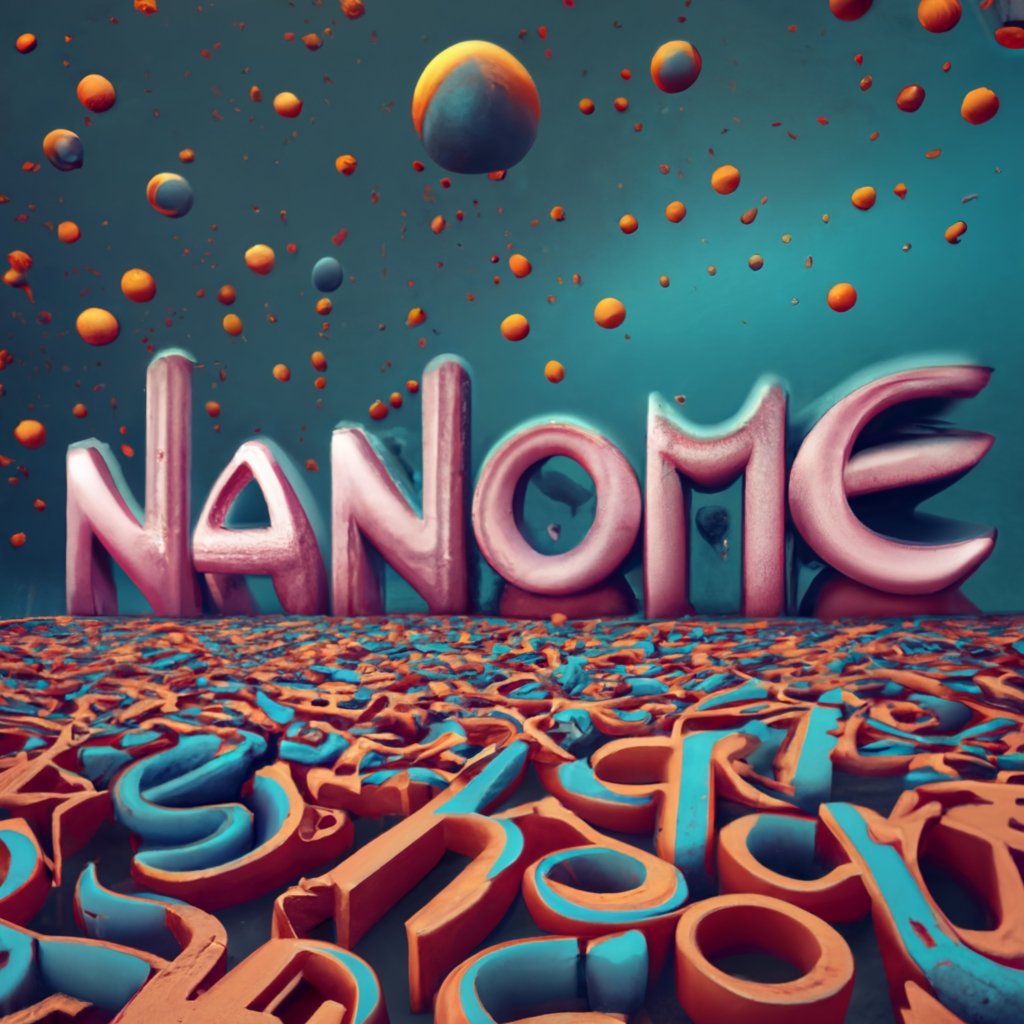
Researchers introduce ‘3D-GPT,’ an artificial intelligence system capable of creating 3D worlds based on simple text instructions
3DGPT is an innovative AI system developed by researchers from the Australian National University, the University of Oxford, and the Beijing Academy of Artificial Intelligence. It represents a significant advancement in the field of 3D modeling, offering a more efficient and intuitive approach to creating 3D assets compared to traditional workflows.
Features:
- Text-Based 3D Modeling: 3DGPT can generate 3D models and scenes from simple text-based descriptions provided by a user.
- Agent-Based Architecture: The system utilizes multiple AI agents, each focusing on different aspects of understanding text prompts and executing modeling functions. These include a task dispatch agent, a conceptualization agent, and a modeling agent.
- Integration with 3D Software: 3DGPT generates code to control existing 3D software like Blender, providing a flexible foundation for future advancements.
Benefits:
- Efficiency: The agent-based approach simplifies the 3D content creation process, making it more accessible and efficient.
- Detail Enhancement: 3DGPT can enhance initial scene descriptions, evolving them into detailed forms while dynamically adapting the text based on subsequent instructions.
- Collaboration with Human Designers: The system has been shown to collaborate effectively with human designers, delivering reliable results.
Technical Details:
- Procedural 3D Modeling: 3DGPT dissects procedural 3D modeling tasks into accessible segments and appoints the appropriate agent for each task.
- Empirical Investigations: The system has been empirically tested and confirmed to interpret and execute instructions effectively.
- Potential Applications: 3DGPT holds potential for various industries, including gaming, virtual reality, cinema, and multimedia experiences.
Access and Usage: As of now, there is no specific information available regarding the accessibility, usage terms, or pricing of 3DGPT. It is still in its early stages of development and has some limitations. However, its development marks a significant step forward in AI-driven 3D modeling and opens up exciting possibilities for future advancements.
Conclusion: 3DGPT is a groundbreaking AI system that highlights the potential of large language models in 3D modeling. It offers a basic framework for future advancements in scene generation and animation, potentially revolutionizing the 3D modeling industry.

Introducing LLEMMA, the open-source AI with a math-centric focus that outperforms its rivals
LLEMMA (Large Language Model for Mathematical Applications) is an innovative open-source large language model (LLM) developed by researchers from various universities and Eleuther AI. It is specifically designed to solve mathematical problems and represents a significant advancement in the field of AI.
Features:
- LLEMMA is built on Code Llama, an adaptation of Meta’s open-source Llama 2 model, and fine-tuned on code-specific datasets.
- It comes in two versions: one with 7 billion parameters and another with 34 billion.
- The model is fine-tuned on Proof-Pile-2, a dataset created by the researchers, which includes scientific papers, web data featuring mathematics, and mathematical code.
- LLEMMA is capable of using computational tools, such as the Python interpreter and formal theorem provers, to solve mathematical problems.
Benefits:
- LLEMMA outperforms other leading math-focused language models, including Google’s Minerva, on an equi-parameter basis.
- It is the first open-source model that matches the performance of state-of-the-art closed-source models, allowing other researchers to build upon and enhance the work further.
- The model demonstrates that with improved data and larger datasets, smaller models can still yield significant results.
- LLEMMA’s achievements can benefit other fields by specializing LLMs for different domains.
Technical Details:
- The researchers have released all their assets, including the 7-billion- and 34-billion-parameter models, the Proof-Pile-2 dataset, and the code to replicate their experiments.
- Proof-Pile-2 includes the AlgebraicStack, a new dataset with 11 billion tokens of code specifically related to mathematics.
- LLEMMA is part of a broader initiative to develop LLMs that specialize in a specific field, rather than a general model capable of performing multiple tasks.
LLEMMA represents a significant stride towards the development of specialized large language models and can propel AI research in new directions, particularly in the realm of mathematical problem-solving.
Other AI News
-
KLA predicts higher-than-expected revenue for the current quarter due to the surge in artificial intelligence demand
KLA, a prominent supplier in the chipmaking equipment industry, has recently announced an optimistic forecast for its current quarter revenue, indicating that it will exceed the estimates set by Wall Street analysts. This surge in revenue expectations is primarily driven by the booming demand for artificial intelligence (AI) tools. The widespread adoption of AI across various sectors has led to an increased need for sophisticated processors, which in turn boosts the demand for advanced chipmaking equipment.
The company’s projection is a clear indication of the growing influence of AI technology in the semiconductor industry. As AI applications become more integrated into everyday technology and business operations, the requirement for high-performance processors continues to rise. This trend not only benefits equipment suppliers like KLA but also highlights the evolving landscape of technology where AI plays a central role. The positive forecast from KLA reflects the broader industry trend where companies are gearing up to meet the escalating demands of an AI-driven market.
-
EVE, a new legal AI startup, debuts with financial backing from Menlo Ventures and Lightspeed Venture Partners
The landscape of legal artificial intelligence is witnessing a surge in competition as new startups continue to emerge, attracting significant investor attention. The latest to join this burgeoning sector is Eve, a legal AI startup that has made a notable entrance into the market. Eve has successfully launched with a substantial financial backing, securing $14 million in seed funding. This investment round has been led by two renowned venture capital firms, Lightspeed Venture Partners and Menlo Ventures, indicating strong investor confidence in the startup’s potential.
This development is a clear testament to the growing interest and investment in the field of legal AI. As technology continues to advance, the integration of AI in legal services is becoming increasingly prevalent, opening new avenues for innovation and efficiency. Startups like Eve are at the forefront of this transformation, leveraging AI to revolutionize legal processes and services. The successful funding of Eve not only marks a significant milestone for the company but also highlights the dynamic and evolving nature of the legal AI market.
-
Biden Takes Steps to Adopt AI for National Security Purposes in New Executive Order
President Biden is poised to sign an executive order next week, focusing on the safe development and use of artificial intelligence (AI) in the U.S. This order aims to establish guidelines for federal agencies and encourage companies to adopt best practices in AI development, particularly emphasizing AI’s role in national security.
The order is also expected to address cybersecurity threats associated with AI, recognizing its potential to improve defenses but also its risks if weaponized. Additionally, it may include measures to limit China’s AI development through U.S. cloud services and streamline the recruitment of AI talent for U.S. companies.
While the White House has begun inviting people to an event on “safe, secure, and trustworthy AI,” details of the order remain under wraps, with a spokeswoman declining to comment. This initiative reflects a recognition of AI’s potential and risks, necessitating deliberate actions to harness its benefits and mitigate its challenges.
-
China Agrees to Attend AI Summit in Britain, Confirms Deputy UK Prime Minister
China has accepted an invitation from Britain to participate in a global summit on artificial intelligence (AI) next week, according to Deputy Prime Minister Oliver Dowden. This development marks a significant engagement between the two countries in the field of AI.
-
Microsoft declares an investment of AUD 5 billion in enhancing computing capacity and capabilities to assist Australia in embracing the era of artificial intelligence
Microsoft has announced a significant investment of A$5 billion in Australia to enhance digital infrastructure, skills, and cybersecurity. This investment, the largest in Microsoft’s 40-year history in Australia, aims to help the nation capitalize on the artificial intelligence (AI) era, strengthen economic competitiveness, create high-value jobs, and bolster cyber defenses.
The investment will expand Microsoft’s hyperscale cloud computing and AI infrastructure in Australia over the next two years, increasing its computing capacity by approximately 250%. This expansion will include growing Microsoft’s local data center footprint from 20 to 29 sites across Canberra, Melbourne, and Sydney.
To maximize the potential of this digital infrastructure, Microsoft is collaborating with TAFE NSW to establish a Microsoft Datacentre Academy in Australia. The company also plans to extend its global skills programs to help more than 300,000 Australians gain capabilities needed in a cloud and AI-enabled economy.
Additionally, Microsoft will partner with the Australian Signals Directorate (ASD) on the Microsoft-Australian Signals Directorate Cyber Shield (MACS) initiative. This collaboration aims to improve protection from cyber threats for Australian residents, businesses, and government entities.
The announcement coincided with Australian Prime Minister Anthony Albanese’s state visit to the United States, highlighting the strategic importance of this investment in Australia’s digital future.
-
Anthropic Expands Claude AI Availability to Additional Countries, Excluding Canada for the Time Being
Anthropic, a San Francisco-based AI startup, has expanded the availability of its Claude 2 large language model (LLM) chatbot to 95 countries. However, Canada is notably absent from this list. While millions of users have already leveraged Claude’s capabilities for various tasks, Canadian users are still waiting for access.
The company has not provided a definitive reason or timeline for Claude’s availability in Canada, but a spokesperson stated that they are working diligently to make it available there as soon as possible. This delay may be related to Canada’s stringent AI regulations, which could be prompting U.S. AI companies to exercise more caution in their expansion plans.
Anthropic, backed by significant funding from Amazon and South Korea Telecom (SKT), is praised for Claude 2’s ability to parse PDFs. However, it currently lacks some features like image generation and multimodal/audio/video/web browsing that are available in other AI models like ChatGPT.
-
Anthropic, Google, OpenAI, and Microsoft announce the appointment of a new Executive Director for the Frontier Model Forum and the establishment of a $10 million AI Safety Fund
OpenAI, Anthropic, Google, and Microsoft have announced Chris Meserole as the first Executive Director of the Frontier Model Forum, an industry body focused on the safe and responsible development of frontier AI models. Meserole’s appointment is part of a broader initiative that includes the creation of a new AI Safety Fund, with over $10 million committed to advancing research in AI safety.
The Frontier Model Forum’s mission includes advancing AI safety research, identifying best practices for frontier models, and sharing knowledge with stakeholders. The AI Safety Fund, supported by industry and philanthropic partners, will fund independent researchers to develop new model evaluations and red teaming techniques for AI models.
In the coming months, the Frontier Model Forum will establish an Advisory Board, issue a call for proposals for the AI Safety Fund, and release additional technical findings. These steps are part of the Forum’s efforts to promote the responsible development and use of AI while addressing safety and security challenges.
-
SK Hynix Predicts AI Surge to Boost Profits Following Narrowed Loss in Third Quarter
South Korea’s SK Hynix, the world’s second-largest memory chipmaker, reported a significantly narrower loss in the third quarter compared to the previous one. This improvement is largely due to robust demand for advanced chips used in artificial intelligence (AI), which helped mitigate the impact of a prolonged slump in demand for commodity chips used in smartphones and computers.
The company highlighted the strong appetite for its high-end DRAM chips, especially those used in generative AI, as a bright spot. SK Hynix is optimistic about the memory chip market’s recovery next year, with Myoungsoo Park, head of DRAM marketing, noting that they are already sold out on next year’s capacity for HBM3 and HBM3E chips. The company has also been ahead of competitors in developing HBM3 chips and securing AI-chip leader Nvidia as a client.
However, SK Hynix’s NAND flash chip business, used in data storage, likely recorded significant losses in the third quarter due to dwindling demand. Analysts are skeptical about the company’s ability to achieve a company-wide profit in the current quarter because of these losses. Despite this, the company’s shares fell 3.6% in morning trade, influenced by Wall Street’s overnight losses and the company’s quarterly loss slightly missing market forecasts.
SK Hynix reported a 1.8 trillion won ($1.33 billion) third-quarter operating loss, marking its fourth consecutive quarterly loss but showing improvement from the first and second quarters. The company noted that the effects of production cuts by memory chipmakers are starting to show, with new orders being placed and chip prices beginning to stabilize. Regarding the planned merger between Kioxia Holdings and Western Digital Corp‘s flash memory business, SK Hynix, a major investor in Kioxia and a rival to both, stated that it does not currently support the deal but did not elaborate on the reasons.
-
Qualcomm Reveals Upcoming AI-Enhanced PC Laptop Chip Set for 2024 Release
Qualcomm has revealed its new Snapdragon Elite X chip for Microsoft Windows-based laptops, boasting that it will surpass Apple’s Mac computer chips in certain tasks. Slated for release in laptops next year, this chip is specially designed to handle artificial intelligence (AI) tasks such as summarizing emails, writing text, and generating images.
This advancement comes as Microsoft encourages chipmakers like Qualcomm, Nvidia, and AMD to develop chips capable of supporting new AI features in Windows, the leading PC operating system. Microsoft CEO Satya Nadella highlighted that these chips are crucial for the emergence of “AI PCs” for both businesses and consumers.
Qualcomm is positioning itself as the first to challenge Apple in this space, claiming that the X Elite is faster and more energy-efficient than Apple’s M2 Max chip and Intel’s PC chips. A key feature of the X Elite, as noted by Qualcomm Senior Vice President Alex Katouzian, is its ability to handle AI models with 13 billion parameters, indicating a high sophistication level for AI systems.
The demand for laptops with AI capabilities is on the rise, with applications ranging from real estate brochures to beer can labels. Francis Sideco, an analyst with TIRIAS Research, emphasized the growing need for such capabilities among both large and small businesses, as well as individual designers and creators.
-
AI Lends a Helping Hand in the Creation of the Beatles’ New Track ‘Now and Then’
Next week, a new Beatles song titled “Now and Then” will be released, featuring the voice of the late John Lennon, created with the help of artificial intelligence. Universal Music Group announced that the song, considered the last Beatles track, also includes recordings by Paul McCartney, Ringo Starr, and the late George Harrison.
McCartney expressed his emotions about hearing Lennon’s voice in the song, calling it a genuine Beatles recording. The song dates back to the late 1970s when Lennon recorded a home demo in New York City. After Lennon’s death, Yoko Ono gave the Beatles a set of recordings, including “Now and Then.” However, technological limitations initially prevented the separation of Lennon’s vocals and piano for a clear mix.
The revival of the song was inspired by Peter Jackson’s 2021 documentary series “The Beatles: Get Back,” which successfully isolated instruments and vocals using AI. This technology was then applied to “Now and Then,” allowing McCartney and Starr to complete the song. It is set to release worldwide at 1400 GMT on Nov. 2. Starr described the experience as emotional, feeling as if Lennon was present during the process.
-
Microsoft’s AI Investments Propel Cloud Growth, Alphabet Still Searching for Breakthrough
Microsoft surpassed Wall Street expectations in its fiscal first-quarter results, with a 13% increase in revenue to $56.5 billion, driven by growth in cloud computing and PC businesses. This surge is partly due to customer anticipation of Microsoft’s artificial intelligence (AI) offerings, despite most products based on its collaboration with OpenAI, including ChatGPT, not yet being fully launched.
In contrast to Microsoft’s success, Google-parent Alphabet‘s cloud division struggled, missing revenue estimates for the third quarter due to economic uncertainty and high interest rates. This highlights a divergence in the performance of major tech companies in the cloud computing sector.
The company’s Intelligent Cloud unit, which includes the Azure cloud-computing platform, saw significant growth with revenue reaching $24.3 billion, surpassing analysts’ estimates. Azure’s revenue alone grew by 29%, indicating a strong performance in the cloud sector. Microsoft reported a fiscal first-quarter profit of $2.99 per share, exceeding analyst expectations. The company is integrating AI into its products, such as the “Copilot” for Microsoft 365, which can summarize a day’s worth of emails.
Looking ahead, Microsoft forecasts an Azure growth rate of 26-27% in constant currency for its fiscal second quarter and expects revenue of $25.1 billion to $25.4 billion for the segment containing Azure. The company also provided optimistic forecasts for its Windows-based business segment and the segment containing LinkedIn, mostly surpassing expectations.
-
AI versus Human Deceit: Deciphering Modern Phishing Strategies
In the realm of cyber threats, AI-driven phishing tactics are becoming alarmingly sophisticated. IBM’s X-Force Red team found that generative AI models can craft highly convincing phishing emails in just five minutes, a task that typically takes a team of social engineers about 16 hours. This efficiency gain for attackers is concerning, as AI-generated phishing emails nearly matched those crafted by experienced social engineers in a phishing simulation against organizations.
The study involved a head-to-head comparison between AI-generated and human-crafted phishing emails. The AI, with only five prompts, produced emails that were persuasive enough to nearly beat those created by seasoned social engineers. The human-generated emails, however, edged out the AI by a narrow margin, thanks to their ability to incorporate emotional intelligence, personalization, and succinct subject lines.
The AI-generated phishing emails were sent to over 800 employees in the healthcare industry, one of the most targeted sectors. The human-generated emails, on the other hand, were crafted using Open-Source Intelligence (OSINT) and tailored to resonate personally with the targets. Despite the close contest, the human-generated emails had a slightly higher click rate and were reported as suspicious at a lower rate compared to the AI-generated ones.
This development signals a pivotal moment in social engineering attacks. While humans still have the upper hand in crafting persuasive emails, the emergence of AI in phishing indicates a significant shift. Attackers are already exploring AI’s use in phishing campaigns, with tools like WormGPT being advertised on various forums. As AI continues to advance, it may become more sophisticated and potentially outperform humans in the future. To combat this emerging threat, businesses and consumers are advised to stay vigilant, verify the legitimacy of emails, abandon stereotypes about phishing, revamp social engineering programs, strengthen identity and access management controls, and constantly adapt to evolving tactics.
-
NVIDIA to make Arm-based PC Chips, Posing Significant Threat to Intel
Nvidia, the leader in artificial intelligence computing chips, is now venturing into the personal computer market, a domain traditionally dominated by Intel. The company has started designing central processing units (CPUs) that would run Microsoft‘s Windows operating system, using technology from Arm Holdings. This initiative is part of Microsoft’s broader effort to support chip companies in developing Arm-based processors for Windows PCs, challenging Apple’s growing market share in this segment.
Advanced Micro Devices (AMD) is also reportedly planning to create chips for PCs using Arm technology. Both Nvidia and AMD could potentially start selling PC chips as early as 2025. This move would place them alongside Qualcomm, which has been producing Arm-based chips for laptops since 2016. Qualcomm is set to reveal more details about a flagship chip, designed by a team of former Apple engineers, at an upcoming event attended by Microsoft executives.
Spokespersons for Nvidia, AMD, Arm, and Microsoft declined to comment on the matter.
The efforts of Nvidia, AMD, and Qualcomm could significantly disrupt the PC industry, which has long been under Intel’s control. Apple‘s custom chips have set a high standard in the market, offering Mac computers enhanced battery life and performance. Microsoft executives have taken note of Apple’s efficient Arm-based chips, particularly their AI processing capabilities, and are aiming to achieve similar performance levels.
-
Researchers Create ‘Woodpecker’: A Revolutionary Approach to Tackling AI’s Hallucination Issue
Researchers from the University of Science and Technology of China (USTC) and Tencent YouTu Lab have developed a groundbreaking framework named “Woodpecker” to address the issue of hallucinations in multimodal large language models (MLLMs). This phenomenon occurs when the text generated by AI is inconsistent with the image content.
Woodpecker introduces a training-free method that corrects hallucinations after a thorough diagnosis. The process involves five stages: key concept extraction, question formulation, visual knowledge validation, visual claim generation, and hallucination correction. This method is likened to a woodpecker healing trees by picking out and correcting hallucinations from the generated text.
The framework works by first identifying the main objects mentioned in the text. It then formulates questions around these objects, such as their number and attributes. Expert models answer these questions in a process called visual knowledge validation. The answers are converted into a visual knowledge base consisting of object-level and attribute-level claims about the image. Finally, Woodpecker modifies the hallucinations and adds corresponding evidence under the guidance of the visual knowledge base.
The researchers have released the source code for Woodpecker and provided an interactive demo for the wider AI community to explore and apply the framework. Comprehensive experiments using various datasets, including POPE, MME, and LLaVA-QA90, have demonstrated Woodpecker’s effectiveness. For instance, on the POPE benchmark, the accuracy of the baseline MiniGPT-4/mPLUG-Owl was significantly boosted from 54.67%/62% to 85.33%/86.33%.
Woodpecker’s ability to correct hallucinations without retraining and its high interpretability make it a potential game-changer in the world of MLLMs (multimodal large language models). It holds immense potential to improve the accuracy and reliability of AI systems in various applications, marking a notable development in the field of artificial intelligence.
-
MonsterAPI Pioneers AI Democratization with User-Friendly, No-Code Fine-Tuning Options
MonsterAPI is leading the way in democratizing AI by offering a no-code platform for fine-tuning open-source large language models (LLMs). This innovative solution makes LLMs more accessible and affordable, allowing a broader range of users to leverage their capabilities. LLMs are powerful AI systems capable of generating human-like text for various applications, but they often require fine-tuning to address specific problems effectively.
The platform simplifies the traditionally complex process of fine-tuning LLMs, which usually demands considerable time, technical expertise, and substantial GPU computing resources. With MonsterAPI, users can select from various open-source models, upload their datasets, or choose from pre-made ones available on the platform, all through a user-friendly interface. This approach eliminates the need for coding skills, making the process more accessible to non-experts.
MonsterAPI’s recent updates have further enhanced its capabilities. Features like QLora with 4-bit quantization and nf4 compress models to minimize memory and bandwidth requirements. Flash Attention 2 boosts training speed and efficiency, while data and model parallelism on multiple GPUs enable the training of larger models with extended context lengths. The platform leverages a decentralized GPU platform, reducing costs and increasing the speed of fine-tuning. Users have the option to pay as they go or subscribe to a plan, with free credits offered to new users upon signing up with a promotional code.
The platform has received positive feedback from users who have utilized it for various purposes, including content creation, summary generation, and chatbot development. MonsterAPI also hosts a vibrant Discord community where users can interact, seek support, and stay updated on the latest developments. By democratizing access to LLMs, MonsterAPI aims to make these powerful tools more useful and affordable for a broader audience.
-
Nanome, a virtual reality startup specializing in molecular science, has introduced an AI copilot known as MARA
Nanome, a San Diego-based startup, has launched an innovative AI copilot named MARA, designed to assist chemists in biopharma research and development. MARA operates through a ChatGPT-like web interface, executing routine cheminformatics tasks and providing insightful responses to scientific queries. This tool is expected to revolutionize the research process by offering capabilities such as exploring, preparing, and rectifying various molecular file formats, including Structure-Activity Relationship (SAR) data.
MARA utilizes large language models (LLMs) and accesses real-time internal data and molecular simulation systems to deliver meaningful answers and suggestions in a conversational tone. It enables chemists to explore new theories and ideas with AI, thereby accelerating the research process. The AI assistant’s capabilities range from handling molecular file formats to performing complex multi-step processes across diverse tools and databases, effectively empowering chemists with the expertise of data scientists.
One of the unique features of MARA is its ability to provide hallucination-free answers. It uses LLMs strictly for planning and reasoning, relying on defined knowledge and deterministic computation and informatics tools to give scientifically accurate information. When unequipped with the necessary tools, MARA admits its limitations instead of providing inaccurate information. This transparency and scientific reliability set MARA apart from other systems.
Currently, MARA is being used by leading pharma companies, and Nanome plans to integrate it into its XR (AR/VR) platform with various modalities such as voice, eye tracking, gestures/hand tracking, and text-based input. The company aims to optimize MARA for biopharma R&D and eventually expand its capabilities to include genetics data, clinical data, material science data, and other scientific disciplines. This development marks a significant step forward in the application of AI in scientific research, particularly in the field of biopharma.
-
Brilliant Labs Secures $3 Million in Funding for AI-Driven Augmented Reality Eyewear
Brilliant Labs, a company specializing in augmented reality (AR) technology, has successfully raised $3 million to develop AI-powered AR glasses. The funding round, which attracted more than the initial target, was supported by notable investors like the Wayfarer Foundation, Steve Sorowitz (founder of Paylocity), and Coho VC. This financial boost places Brilliant Labs in a competitive position against other AR devices, such as Meta’s Ray-Ban Meta smartglasses.
The company has also rebranded its generative AI app to “NOA,” formerly known as “arGPT,” and integrated Stability AI, a visual open-source AI model, into its flagship AR device, Monocle. This integration marks a significant advancement in combining various global generative AI models, including Whisper, Stability AI, and ChatGPT, within a wearable device. The Monocle allows users to create AI-generated imagery from real-time snapshots of their surroundings.
Brilliant Labs and the Wayfarer Foundation are leading the development of the world’s first ethics framework for head-mounted AI devices, setting a new standard in the industry. The Noa app, available on iOS and Android, connects to the Monocle AR wearable via Bluetooth. Users can capture images with Monocle’s front-facing camera and use voice commands to edit these images using Stability AI. This feature offers developers the opportunity to experiment and adjust the visual style of the generated images.
Founded in 2019 by ex-Apple employee Bobak Tavangar and his co-founders, Brilliant Labs aims to revolutionize human-device interactions with its generative AI-embedded AR glasses. The company’s flagship product, Monocle, is an open-source wearable AR device designed to inspire hackers and creatives in reimagining the future of wearable AI. With total seed funding exceeding $6 million, Brilliant Labs has garnered support from prominent investors and is poised to make significant strides in the AR and AI industries.
-
AutogenAI debuts in the U.S. to automate proposal writing
AutogenAI, a company specializing in generative AI for bid and proposal writing, has recently expanded its operations to the U.S. market. The UK-based company, which has experienced significant growth in its first year, claims its platform can shorten the lengthy and complex process of proposal writing from weeks to just a few days. Elizabeth Lukas has been appointed as the CEO for the Americas, and the company is focusing on building its U.S. sales team and strategy.
The bid and proposal market is substantial, with the U.S. government alone committing around $694 billion to contracts in Fiscal Year 2022. AutogenAI’s platform uses natural language processing (NLP) to learn an organization’s specific language and knowledge, enabling it to rapidly generate proposal drafts. This efficiency allows teams to shift their focus from fact-chasing to strategizing for winning bids.
AutogenAI’s technology has been beneficial beyond just bidding and proposals, finding applications in areas like analysis, reporting, marketing, and human resources. The company has already supported various sectors, including managed service and consultancy firms, healthcare, government entities, and IT. There are also emerging opportunities in grant writing for nonprofits and research universities.
The company emphasizes that their AI technology is meant to augment human intelligence, not replace it. They aim to help workers understand and integrate AI into their workflows, enhancing productivity. The rapid growth and interest in generative AI, especially post-ChatGPT, have contributed significantly to AutogenAI’s success. The company views written communication as a uniquely human act and finds the ability of AI to create compelling and creative writing awe-inspiring.
-
Shutterstock Unveils AI-Powered Image Editing Tool for Its Vast 750 Million Image Collection
Shutterstock, a well-known stock image provider, has introduced an AI-powered image editor for its vast library of 750 million pictures. This new feature, built into the Shutterstock website using OpenAI‘s DALL-E 2 model, enables users to modify existing stock photos by adding elements, changing colors, removing items, and more. The goal is to make it easier for users, from publications to brands, to find and personalize images to fit their needs.
The new editing capabilities include tools like “Magic Brush” for altering images, “Variations” for generating alternate options, “Expand Image” for broadening the view, “Smart Resize” for changing image shape, and “Background Remover” for altering backgrounds. Additionally, an “AI Image Generator” allows the creation of high-quality visuals by simply describing the desired image.
Shutterstock’s approach to AI integration is unique as it focuses on editing existing imagery from its paid creative community, ensuring contributors are compensated. The company emphasizes responsible and ethical AI use and does not accept AI-generated or edited content for licensing on the platform. Shutterstock is also a member of the Content Authenticity Initiative, promoting transparency and truth in digital content.
The introduction of these AI features marks Shutterstock’s move to compete with other image editing and graphic design programs, aiming to provide users with a comprehensive tool for image manipulation and personalization.
About The Author

Bogdan Iancu
Bogdan Iancu is a seasoned entrepreneur and strategic leader with over 25 years of experience in diverse industrial and commercial fields. His passion for AI, Machine Learning, and Generative AI is underpinned by a deep understanding of advanced calculus, enabling him to leverage these technologies to drive innovation and growth. As a Non-Executive Director, Bogdan brings a wealth of experience and a unique perspective to the boardroom, contributing to robust strategic decisions. With a proven track record of assisting clients worldwide, Bogdan is committed to harnessing the power of AI to transform businesses and create sustainable growth in the digital age.








Leave A Comment